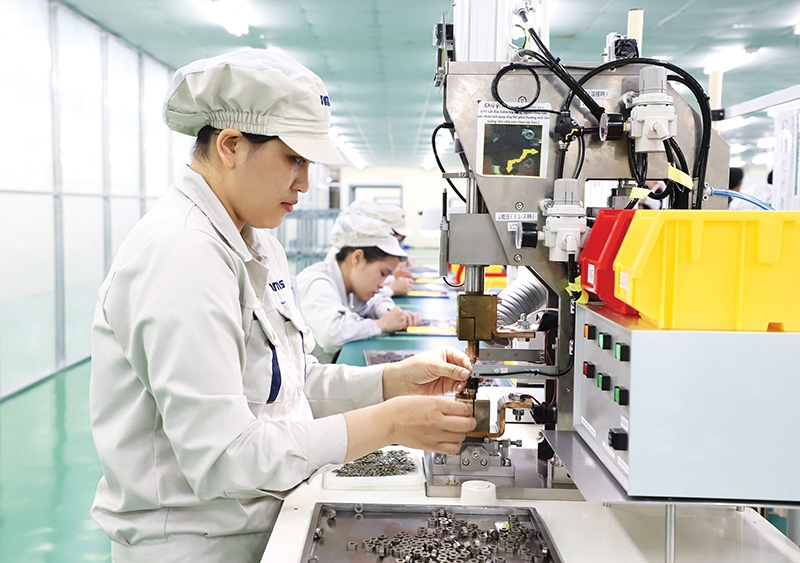Graduate unemployment threatening new workforce
 |
| Graduate unemployment threatening new workforce, illustration photo: Duc Thanh |
“Graduation means unemployment” has often been a popular joke among college and university students when graduation arrives. However, this year it is not merely a joke, instead reflecting a predictable future for many as the global health crisis continues to affect the planet.
Tourism management graduate Hoang Lan, who is living in Hanoi, has been sending out job applications to dozens of companies. But the uninvited pandemic came to town, pushing many businesses – especially those specialising in tourism and hospitality – into a significant downturn and forcing them to cancel all job interviews, or offer applicants a much lower salary than planned.
“I was bewildered and disappointed,” said Lan. “Many of my newly-graduated friends are in the same situation. Some of them have been interns for two years and received promises of becoming full-time employees. But when the pandemic came, their companies went bankrupt.”
University seniors are also trying hard to look for internship positions.
As a final-year student majoring in international business, Duy Khanh said that senior students like him are struggling as businesses are not very welcoming towards new interns.
“Major enterprises are gradually recovering production and focusing on recruiting full-time staff or trainees for probation, but there are very few chances for interns like us. I have sent my CV to at least five to six companies but received no positive responses,” said Khanh.
According to a recent report from the General Statistics Office, the recruitment demand from foreign-invested enterprises and domestic companies in the second quarter had been slashed by 20 per cent compared to the first quarter.
Meanwhile, in the first half of the year, the demand for human resources in Ho Chi Minh City decreased by 28 per cent on-year. This dramatic decrease was felt across several industries such as food and beverages, tourism, transport, textiles and garments, and construction.
In Binh Duong – a locality in the southern key economic region – the labour demand in the first six months also dropped by 63 per cent over the same period of 2019, while the number of job seekers increased by 16 per cent.
This situation has caused the number of employed workers aged 15 and above in Vietnam to decline by 2.4 million in the second quarter compared to the previous one, and by nearly 2.6 million compared to the same period in 2019.
As businesses try to revive themselves, the opportunities for many newly-graduated workers remain limited because most of the companies prioritise experienced personnel. According to a survey by Vietnamese recruitment platform Topcv.vn, only 29.6 per cent of businesses are willing to hire inexperienced candidates and fresh graduates.
Such requirement is not only a tough challenge for the higher-educated workforce who graduated from universities and colleges, but also becomes a barrier blocking the career path of nearly 255,000 high school graduates with no plan to attend universities or colleges, according to the Ministry of Education and Training.
Viet Hoang, an 18-year-old in Hanoi’s Ba Vi district, shared that due to his family’s difficult circumstances, he planned to get a job straight away after finishing high school. However, the job as a warehouse clerk for him no longer exists because the company closed in June.
“There are some places that recruit security guards, but the salary is as low as only VND4 million ($175) per month,” Hoang said.
“Reluctantly, I went to the Youth Employment Services Centre in Hanoi, and they comforted me that 90 per cent of people who came to the centre for help had found a job. However, the opportunities for unskilled labourers like me are very small,” Hoang added.
What the stars mean:
★ Poor ★ ★ Promising ★★★ Good ★★★★ Very good ★★★★★ Exceptional
 Tag:
Tag:
Related Contents
Latest News
More News
- Congratulations from VFF Central Committee's int’l partners to 14th National Party Congress (January 25, 2026 | 09:46)
- List of newly-elected members of 14th Political Bureau announced (January 23, 2026 | 16:27)
- 14th Party Central Committee unanimously elects To Lam as General Secretary (January 23, 2026 | 16:22)
- List of members of 14th Party Central Committee announced (January 23, 2026 | 09:12)
- Highlights of fourth working day of 14th National Party Congress (January 23, 2026 | 09:06)
- Press provides timely, accurate coverage of 14th National Party Congress (January 22, 2026 | 09:49)
- Press release on second working day of 14th National Party Congress (January 22, 2026 | 09:19)
- Minister sets out key directions to promote intrinsic strength of Vietnamese culture (January 22, 2026 | 09:16)
- 14th National Party Congress: Renewed momentum for OVs to contribute to homeland (January 21, 2026 | 09:49)
- Party Congress building momentum for a new era of national growth (January 20, 2026 | 15:00)





















 Mobile Version
Mobile Version